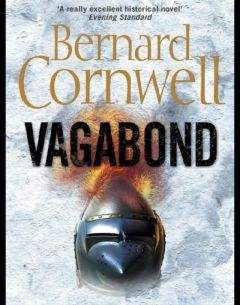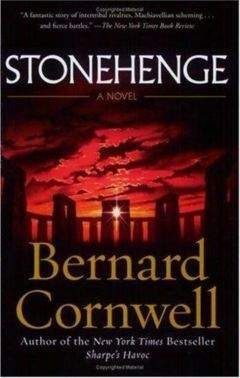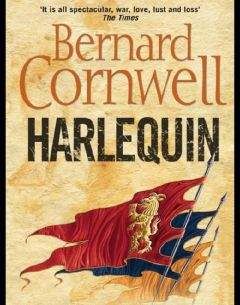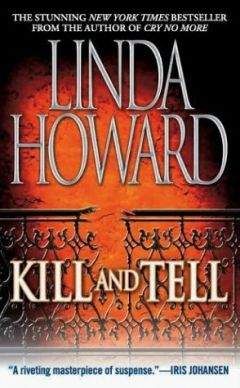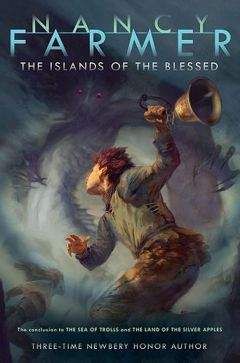'It would be easier,' the servant said, 'to kill you on the road and then go on without you.'
'But you won't do that,' de Taillebourg said, 'because the grace of God has come into your soul.'
'Thanks be to God,' the servant said.
The man was not a servant by birth, but a knight and gently born. Now, at de Taillebourg's pleasure, he was being punished for his sins and for the sins of his family. There were those, and Cardinal Bessieres was among them, who thought the man should have been stretched on the rack, that he should have been pressed by great weights, that the burning irons should have seared into his flesh so that his back arched as he screamed repentance at the ceiling, but de Taillebourg had persuaded the Cardinal to do nothing except show this man the instruments of the Inquisition's torture. 'Then give him to me,'
de Taillebourg had said, 'and let hint lead me to the Grail.'
'Kill him afterwards,' the Cardinal had instructed the Inquisitor.
'All will be different when we have the Grail,' de Taillebourg had said evasively. He still did not know whether he would have to kill this thin young man with the sun-dark skin and the black eyes and the nar-row face who had once called himself the Harlequin. He had adopted the name out of pride because harlequins were lost souls, but de Taillebourg believed he might well have saved this harlequin's soul. The Harlequin's real name was Guy Vexille, Count of Astarac, and it had been Guy Vexille whom de Taillebourg had been describing when he spoke to Brother Collimore about the man who had come from the south to fight for France in Picardy. Vexille had been seized after the battle when the French King had been looking for scapegoats and a man who dared display the crest of a family declared heretic and rebel had made a good scapegoat. Vexille had been given to the Inquisition in the expectation that they would torture the heresy out of him, but de Taillebourg had liked the Harlequin. He had recognized a fellow soul, a hard man, a dedicated man, a man who knew that this life meant nothing because all that counted was the next, and so de Taillebourg had spared Vexille the agonies. He had merely shown him the chamber where men and women screamed their apologies to God, and then he had questioned him gently and Vexille had revealed how he had once sailed to England to find the Grail and, though he had killed his uncle, Thomas's father, he had not found it. Now, with de Taillebourg, he had listened to Eleanor tell Thomas's story. 'Did you believe her?' the Dominican now asked.
'I believed her,' Vexille said.
'But was she deceived?' The Inquisitor wondered. Eleanor had told them that Thomas had been charged to seek the Grail, but that his faith was weak and his search halfhearted. 'We shall still have to kill him,' de Taillebourg added.
'Of course.'
De Taillebourg frowned. 'You do not mind?' 'Killing?' Guy Vexille sounded surprised that de Taillebourg should even ask. 'Killing is my job, father,' the Harlequin said. Cardinal Bessieres had decreed that everyone who sought the Grail should be killed, all except those who sought it on the Cardinal's own behalf, and Guy Vexille had willingly become God's murderer. He certainly had no qualms about slitting his cousin Thomas's throat.
'You want to wait here for him?' he asked the Inquisitor. 'The girl said he would be in the cathedral after the battle.'
De Taillebourg looked across to the hill. The Scots would win, he was sure, and that made it doubtful that Thomas of Hookton would come to the city. More likely he would flee southwards in panic. 'We shall go to Hookton.'
'I searched Hookton once,' Guy Vexille said.
'Then you will search it again,' de Taillebourg snapped.
'Yes, father.' Guy Vexille humbly lowered his head. He was a sinner; it was required of him that he show penitence and so he did not argue. He just did de Taillebourg's bidding and his reward, he had been promised, would be reinstatement. He would be given back his pride, allowed to lead men to war again and forgiven by the Church.
'We shall leave now,' de Taillebourg said. He wanted to go before William Douglas came in search of them and, even more urgently, before anyone discovered the three bodies in the hospital cell. The Dominican had closed the door on the corpses and doubtless the monks would believe Collimore was sleeping and so would not disturb him, but de Taillebourg still wanted to be free of the city when the bodies were found and so he pulled himself into the saddle of one of the horses they had stolen from Jamie Douglas that morning. It seemed a long time ago now. He pushed his shoes into the stirrups, then kicked a beggar away. The man had been clawing at de Taillebourg's leg, whining that he was hungry, but now reeled away from the priest's savage thrust. The noise of battle swelled. The Dominican looked at the ridge again, but the fight was none of his business. If the English and the Scots wished to maul each other then let them. He had greater matters on his mind, matters of God and the Grail and of heaven and hell. He had sins on his conscience too, but they would be shriven by the Holy Father and even heaven would understand those sins once he had found the Grail. The gates of the city, though strongly guarded, were open so that the wounded could be brought inside and food and drink carried to the ridge. The guards were older men and had been ordered to make certain that no Scottish raiders tried to enter the city, but they had not been charged to stop anyone leaving and so they took no notice of the haggard priest with the bruised face mounted on a warhorse, nor of his elegant servant. So de Taillebourg and the Harlequin rode out of Durham, turned towards the York road, put back their heels and, as the sound of battle echoed from the city's crag, rode away southwards. It was mid-afternoon when the Scots attacked a second time, but this assault, unlike the first, did not come hard on the heels of fleeing archers. Instead the archers were drawn up ready to receive the charge and this time the arrows flew thick as starlings. Those on the Scottish left who had so nearly broken the English line were now faced by twice as many archers, and their charge, which had begun so confidently, slowed to a crawl and then stopped altogether as men crouched behind shields. The Scottish right never advanced at all, while the King's central sheltron was checked fifty paces from the stone wall behind which a crowd of archers sent an incessant shower of arrows. The Scots would not retreat, they could not advance, and for a time the long-shafted arrows thumped onto shields and into carelessly ex-posed bodies, then Lord Robert Stewart's men edged back out of range and the King's sheltron followed and so another pause came over the red-earthed battlefield. The drums were silent and no more insults were being shouted across the littered pastureland. The Scottish lords, those who still lived, gathered under their King's saltire banner and the Archbishop of York, seeing his enemies in council, called his own lords together. The Englishmen were gloomy. The enemy, they reasoned, would never expose themselves to what the Archbishop described as a third baptism of arrows. 'The bastards will slink off northwards,' the Archbishop predicted,
'God damn their bloody souls.'
'Then we follow them,' Lord Percy said.
'They move faster than us,' the Archbishop said. He had taken off his helmet and its leather liner had left an indentation in his hair, circling his skull.
'We'll slaughter their foot,' another lord said wolfishly.
'Damn their infantry,' the Archbishop snapped, impatient with such foolery. He wanted to capture the Scottish lords, the men mounted on the swiftest and most expensive horses, for it was their ransoms that would make him rich, and he especially wanted to capture those Scottish nobles like the Earl of Menteith who had sworn fealty to Edward of England and whose presence in the enemy army proved their treachery. Such men would not be ransomed, but would be executed as an example to other men who broke their oaths, but if the Archbishop was victorious today then he could lead this small army into Scotland and take the traitors' estates. He would take everything from them: the timber from their parks, the sheets from their beds, the beds themselves, the slates off their roofs, their pots, their pans, their cattle, even the rushes from their streambeds. 'But they won't attack again,' the Archbishop said.
'Then we shall have to be clever,' Lord Outhwaite put in cheerfully. The other lords looked suspiciously at Outhwaite. Cleverness was not a quality they prized for it hunted no boars, killed no stags, enjoyed no women and took no prisoners. Churchmen could be clever, and doubtless there were clever fools at Oxford, and even women could be clever so long as they did not flaunt it, but on a battlefield? Cleverness?
'Clever?' Lord Neville asked pointedly.
'They fear our archers,' Lord Outhwaite said, 'but if our archers are seen to have few arrows, then that fear will go and they might well attack again.'
'Indeed, indeed ...' the Archbishop began and then stopped, for he was quite as clever as Lord Outhwaite, clever enough, indeed, to hide how clever he was. 'But how would we convince them?' he asked.
Lord Outhwaite obliged the Archbishop by explain-ing what he suspected the Archbishop had already grasped. 'I think, your grace, that if our archers are seen scavenging the field for arrows then the enemy will draw the correct conclusion.'
'Or, in this case,' the Archbishop laid it on broadly for the benefit of the other lords,
'the incorrect conclusion.'
'Oh, that's good,' one of those other lords said warmly.
'It could be made even better, your grace,' Lord Outhwaite suggested diffidently, 'if our horses were brought forward? The enemy might then assume we were readying ourselves to flee?'
The Archbishop did not hesitate. 'Bring all the horses up,' he said.
'But ...' A lord was frowning.
'Archers to scavenge for arrows, squires and pages to bring up the horses for the menat-arms,' the Arch-bishop snapped, understanding completely what Lord Outhwaite had in mind and eager to put it into effect before the enemy decided to withdraw northwards. Lord Outhwaite gave the orders to the bowmen him-self and, within a few moments, scores of archers were out in the space between the armies where they gathered spent arrows. Some of the archers grumbled, call-ing it tomfoolery because they felt exposed to the Scottish troops who once again began to jeer them. One archer, farther forward than most, was struck in the chest by a crossbow quarrel and he fell to his knees, a look of astonishment on his face, and choked up blood into his cupped palm. Then he began weeping and that only made the choking worse and then a second man, going to help the first, was hit in the thigh by the same crossbow. The Scots were howling their derision at the wounded men, then cowered as a dozen English archers loosed arrows at the lone crossbowman. 'Save your arrows! Save your arrows!' Lord Outhwaite, mounted on his horse, roared at the bowmen. He galloped closer to them. 'Save your arrows! For God's sake! Save them!' He was bellowing loud enough for the enemy to hear him, then a group of Scotsmen, tired of sheltering from the archers, ran forward in an evident attempt to cut off Lord Outhwaite's retreat and all the English scampered for their own line. Lord Outhwaite put back his spurs and easily evaded the rush of men who contented themselves with butchering the two wounded archers. The rest of the Scots, seeing the English run, laughed and jeered. Lord Outhwaite turned and gazed at the two dead bowmen. 'We should have brought those lads in,' he chided himself. No one answered. Some of the archers were looking resentfully at the men-at-arms, supposing that their horses had been brought up to aid their flight, but then Lord Outhwaite barked at groups of archers to get behind the men-at-arms. 'Line up at the back!
Not all of you. We're trying to make them believe we're short of arrows and if you didn't have arrows you wouldn't be standing out in front, now would you? Hold the horses where they are!' He shouted this last order to the squires, pages and servants who had brought up the destriers. The men-at-arms were not to mount yet, the horses were simply being held at the back of the line, just behind the place where half the archers now formed. The enemy, seeing the horses, must conclude that the English, short of arrows, were contemplating flight.
And so the simple trap was baited.
A silence fell on the battlefield, except that the wounded were moaning, ravens calling and some women crying. The monks began to chant again, but they were still on the English left and to Thomas, now on the right, the sound was faint. A bell rang in the city.
'I do fear we're being too clever,' Outhwaite re-marked to Thomas. His lordship was not a man who could keep silent and there was no one else in the right-hand division convenient for conversation and so he selected Thomas. He sighed. 'It doesn't always work, being clever.'
'It worked for us in Brittany, my lord.'
'You were in Brittany as well as Picardy?' Lord Outhwaite asked. He was still mounted and was gazing over the men-at-arms towards the Scots.
'I served a clever man there, my lord.'
'And who was that?' Lord Outhwaite was pretending to be interested, perhaps regretting that he had even begun the conversation.
'Will Skeat, my lord, only he's Sir William now. The King knighted him at the battle.'
'Will Skeat?' Lord Outhwaite was engaged now. 'You served Will? By the good Lord, you did? Dear William. I haven't heard that name in many a year. How is he?'
'Not well, my lord,' Thomas said, and he told how Will Skeat, a commoner who had become the leader of a band of archers and men-at-arms 'vho were feared wherever men spoke French, had been grievously wounded at the battle in Picardy. 'He was taken to Caen, my lord.'
Lord Outhwaite frowned. 'That's back in French hands, surely?'
'A Frenchman took him there, my lord,' Thomas explained, 'a friend, because there's a doctor in the city who can work miracles.' At the end of the battle, when men could at last think they had lived through the horror, Skeat's skull had been opened to the sky and when Thomas had last seen him Skeat had been dumb, blind and powerless.
'I don't know why the French make better physicians,' Lord Outhwaite said in mild annoyance, 'but it seems they do. My father always said they did, and he had much trouble with his phlegm.'
'This man's Jewish, my lord.'
'And with his shoulders. Jewish! Did you say Jewish?' Lord Outhwaite sounded alarmed. 'I have nothing against Jews,' he vvent on, though without conviction, 'but I can think of a dozen good reasons why one should never resort to a Jewish physician.'
'Truly, my lord?'
'My dear fellow, how can they harness the power of the saints? Or the healing properties of relics? Or the efficacy of holy water? Even prayer is a mystery to them. My mother, rest her soul, had great pain in her knees. Too much praying, I always thought, but her physician ordered her to wrap her legs in cloths that had been placed on the grave of St Cuthbert and to pray thrice a day to St Gregory of Nazianzus and it worked! It worked! But no Jew could prescribe such a cure, could he? And if he did it would be blasphemous and bound to fail. I must say I think it most ill advised to have placed poor Will into a Jew's hands. He deserves better, indeed he does.' He shook his head reprovingly. 'Will served my father for a time, but was too smart a fellow to stay cooped up on the Scottish border. Not enough plunder, you see? Went off on his own, he did. Poor Will.'
